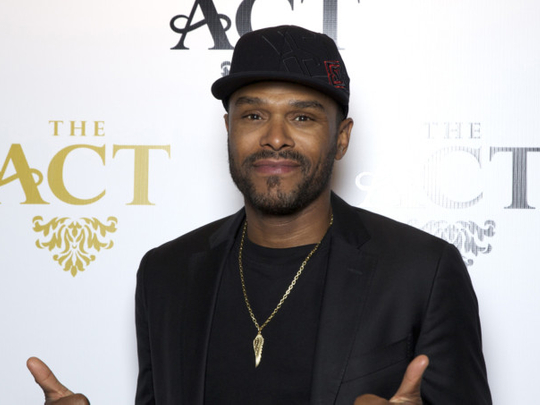
Before a word is even said, Maxwell already knows the first thing everyone wants to ask him. “When is the album coming,” he says with a laugh.
“It’s a good question, because it means people care,” he says, speaking by phone from his Las Vegas hotel after a recent gig. “So I understand.”
The revered soul singer (born Gerald Maxwell Rivera) has made a career of crafting elegant and seductive R&B rooted in smooth jazz and funk, which since the 1990s has yielded the hit albums Urban Hang Suite, Embrya and Now. But in recent years, he’s become best known for pulling one of pop music’s most frustrating disappearing acts.
In 2009, Maxwell issued BLACKsummers’night, his first album in eight years. The first in a planned trilogy, the album was one of the year’s most lauded releases, topping several critics’ year-end lists and scoring him his first Grammy Awards. He went on two back-to-back successful tours. And then he disappeared — again.
Five years later, is Maxwell any closer to a comeback? Finally, the answer is yes.
Although there’s still no firm release date for a new album, the singer is, at least, back on the road. Earlier this month, he launched his nearly 40-date Summer Soulstice tour — his first outing since 2010. The tour, he claims, means he’s ready to deliver the second instalment of the trilogy. Originally planned for release in 2010, Summers will arrive later this year, he promises.
“When I know what I’ve got, and I’m sure about it, that’s when I go,” the 41-year-old singer said. “You always know what is happening when there is a full tour.”
Maxwell’s comeback tour also launched the 2014 BET Experience, a three-day festival sponsored by the cable network that took over the LA Live complex downtown.
Mention how long the wait has been since BLACKsummers’night, and Maxwell will tell you that he’s not counting.
“Maybe that’s a compliment, when people add the time,” says the Brooklyn-based singer. “It’s a lot of pressure for me, because people want this instantaneous release, consecutively, but I think there’s something good about the time. You get to really appreciate it more. I would just rather be missed — hopefully appreciated — and with time deliver something that makes people go, ‘OK, he went through something.’
“They don’t understand I’m not getting songs written for me. [People] aren’t sending me tracks. Everything is written by us. It’s not like someone is sending me a beat and I rapped on it or I sang on it and, boom, done. I have to actually think about how am I being creative and how am I actually being commercially viable to the world. It takes me some time to do that.”
In the meantime? Maxwell has been living life. “You can’t produce constantly and you didn’t do anything,” he says. “You didn’t evolve. You didn’t turn 40. What did you do? You just put records out.”
Vocal injury
But he was also derailed by a vocal injury two years ago.
While working on Summers, Maxwell announced an ambitious engagement of two-night stands in a trio of cities, including LA, where he would have performed his entire discography. He was forced to cancel the 2012 trek when doctors put him on vocal rest after he developed vocal cord oedema and a vocal cord haemorrhage.
“It wasn’t as much of an impact as it was a story itself,” he says of the resulting surgery. “Once I was done, I was recording. It was something I kind of had to attend to because I had been slacking off on healing. For me, being healthy and having my voice be on point was worth more than me not meeting a commitment.”
Maxwell doesn’t offer much, if anything, about the new album.
“We’re just going to shut it down and put it out. I feel good about it,” he says. “There’s so much with it, there’s documentary, video content ... I think we’re there.”
He’s arguably earned the right to be cagey about his projects. Once dubbed the “Marvin Gaye of the ‘90s,” Maxwell — like Erykah Badu, D’Angelo, Lauryn Hill and Jill Scott — was part of a wave of acts seen as soul revivalists with works that infused jazz, funk and African elements into R&B, birthing the new-soul genre.
Maxwell’s comeback comes at a time when the genre has again been shifted by forward-thinking new voices. Just don’t expect him to try to fit in.
“I’m not a child. I don’t understand the intricacies and delicacies of certain trends, nor do I feel like I should adhere to them.
“You’re always trying to redefine yourself. I’m always trying to upgrade and mess with the sound and change how I look. But I keep the soul intact as much as I can; that’s what I’m known for. And that’s what I think is most needed in the music industry: soulful singers, people who can really sing and really emote.”
Maxwell will use his time on the road to put the finishing touches on the album. And as much as he’s certain the album will be released this year, he’s equally certain of the reaction.
“I bet you as soon as this one comes out, next year [people] will be, like, ‘So when’s the next one?’” he says with a laugh. “But I don’t like to rush to fail. I’d rather take my time to succeed. ”










